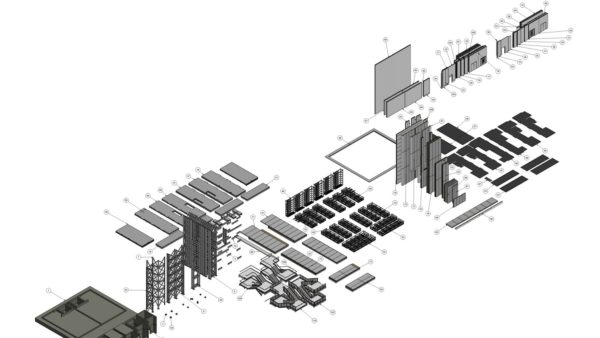Jozef Dobos, CEO and founder of 3D Repo, explores the findings in a European Construction Industry Federation position paper on the need for interoperability between software systems.
Construction software has the potential to transform our built environment for the better, and in this sector, like many others, it’s not unusual for only a few very large software vendors to dominate the market.
But this market structure also begs some key questions. Even if the software is good and effective, does this market dominance create an unfair deal for customers? And is it thwarting the very aim that we are all striving for, steering the industry away from its potential to be genuinely collaborative and democratic?
These questions are explored in a European Construction Industry Federation (FIEC) position paper from earlier this year which raises concerns around potential exploitation in the relationships between construction software providers and their users.
FIEC members have highlighted the disadvantageous situations contractors can find themselves in due to “unfavourable” licensing and contractual arrangements from dominant software companies, lack of collaboration around open data and open standards, and the threat of software companies hosting data outside of EU jurisdiction.
License limitations
They argue that there is often a distinct lack of choice when it comes to choosing construction software and the purchasing options are limited. Software products are regularly updated and so may leave the user with no choice but to pay and upgrade while facing regular problems with a loss of data throughout the progress. There may also be no choice but to use the same software that the supply chain is using to access the native file data.
This is especially true for companies such as tier 2 contractors and smaller companies who often have no choice as the data they need is “locked in” by the software choices determined by the main contractor or the client. If they choose not to go with it, they risk being left behind, or worse, they will be unable to access the information they need.
It is an unfair system that creates a no-win situation for the customer and a ‘winner takes all’ situation for the large vendor.
All software users should have a choice in what they use, the right to access data without paying an access tax and be given licencing options that work for them. A one-size-fits-all approach is not the answer. We believe both commercial subscriptions and open-source licensing options should be available to all to allow maximum flexibility.
At 3D Repo, we currently use two structures. The first is a user-based licence model that can be used across several projects, a popular option for architects and consultants. The second is a project-based licence, which usually suits contractors. However, these options can also be customised, because we understand that each customer is facing different challenges. It is our job to respond to the customers’ needs, not the other way around.
Putting a price on data
Having access to high-quality data can make a substantial difference in how efficiently and quickly a project is delivered, creating value.
Therefore, the software should ensure interoperability of data. It should also give users the choice to use the tools they need and want.
Unfortunately, this process is hampered by proprietary data silos. During a project, particularly at the design and construction stages, data should be accessible to all and then held by the data owner in an open format. This means information for that project remains at the discretion of the data owner, but can be easily transferred as and when needed in the future. Otherwise what is the point?
That is why the FIEC raises concerns about data being held in clouds belonging to software vendors. If the user decides to change vendor or leave the cloud, that option may not exist. That means their data is lost forever unless they remain tied into a contract that they do not want. The FIEC rightly contests this status quo and its implications for fair competition. Data should belong to the owner and it is unethical for vendors to control how it is stored and shared.
3D Repo offers the option for the platform to be run on both private cloud servers and local servers. An open source platform is critical to promoting the ability for project teams to collaborate and share BIM data and 3D models easily. This was the founding principle for 3D Repo, making it accessible to the user anytime and anywhere.
When somebody in the project team inputs even proprietary data format, it is stored in an open data schema in addition to its original format, making it widely accessible.
However, the data owner retains their rights and can retrieve the data at any time from 3D Repo’s servers via its user interface, manually as well as automatically via an open application programming interface (API).
Sharing is caring
All the issues raised by the FIEC must be addressed to enable the genuine digitisation of the construction industry.
3D Repo was created to enable the construction industry to work better together and to create better buildings. This is why projects like the AEC Delta Mobility initiative in collaboration with BuroHappold Engineering and Speckle Systems are so important, creating a new standard for designers, integrators and fabricators to improve the flow of data.
The current method of sharing information as files of entire 3D models can hinder collaboration. Tracking changes can also be problematic and inefficient for design communication. AEC Delta Mobility breaks down the file barriers to enable small design changes, known as ‘Deltas’, to be shared faster, more openly and more efficiently.
This is how the software industry should be working with the construction industry. Real solutions that involve working with customers and providing them with tools they will not want to walk away from, based on commercial terms that actually promote the collaborative behaviours we want to see, not divide us into software silos.
Comments
Comments are closed.














Links to the paper
Link to Commissioner letter
http://fiec.eu/en/cust/documentview.aspx?UID=94da9a78-f928-4723-8b69-4e6112b9bbde
Link to paper
http://fiec.eu/en/cust/documentrequest.aspx?UID=0df66ec9-58fe-4d0d-b3e9-edf77a95c2d6